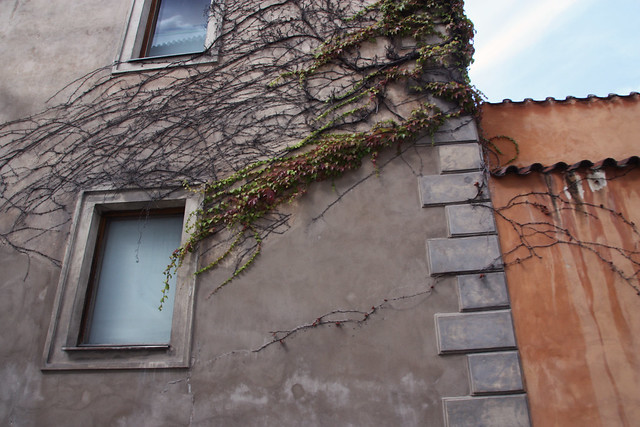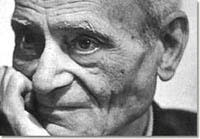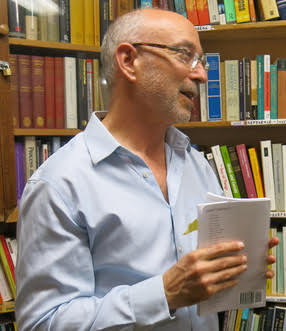
Leaves
How many of them are gone now…
How many.
What’s left.
Not even
a breath.
Not even
a speck of resentment or the taste
of a presence.
All of them
gone without
a trace.
The way
wind leaves no trace
when it passes over marble.
The way
a shadow makes no footprint
on the sidewalk.
All of them
vanished in a vague
dust cloud of sight.
A hubbub
of mute voices, as if
viewing leaves
through a misted window.
Leaves
that only the heart sees
and the mind doesn’t believe in.
Foglie
Quanti se ne sono andati…
Quanti.
Che cosa resta.
Nemmeno
il soffio.
Nemmeno
il graffio di rancore o il morso
della presenza.
Tutti
se ne sono andati senza
lasciare traccia.
Come
non lascia traccia il vento
sul marmo dove passa.
Come
non lascia orma l’ombra
sul marciapiede.
Tutti
scomparsi in un polverio
confusi d’occhi.
Un brusio
di voci afone, quasi
di foglie controfiato
dietro i vetri.
Foglie
che solo il cuore vede
e cui la mente non crede.
Ticket Thrown Away Before Not Leaving
If I don’t come home,
I want you to know that I never
left.
My travels
have all been staying
right here, where I never was.
Biglietto lasciato prima di non andar via
Se non dovessi tornare,
sappiate che non sono mai
partito.
Il mio viaggiare
È stato tutto un restare
qua, dove non fui mai.
To the Hunters
Stop! You will
never hit a bull’s eye.
That beast you’re pursuing —
you’re already inside it
Saggia apostrofe a tutti i caccianti
Fermi! Tanto
non farete mai centro.
La Bestia che cercate voi,
voi ci siete dentro.
There Are Women Who Know
There are women who know
the ocean so completely
that you feel a sea breeze blow
when they pass you discreetly
and you sense with cool skin
sails opening within
and with the lips of clams
delicious quarrels begin.
Sono donne che sanno
Sono donne che sanno
così bene il mare
che all’arietta che fanno
a te accanto al passare
senti sulla tua pelle
fresco aprirsi di vele
e alle labbra d’arselle
deliziose querele.
Prayer
My weightless soul,
travel to Livorno, I’m begging you.
And when you hold your shy
candle at nighttime
look around, and if you have a moment,
scour and search, letting
me know if by chance Anna Picchi
is still among the living.
This very day I’m returning
to Livorno, still yearning.
But you, much sharper
than I, will remember her blouse
and the blood-red ruby on the gold serpent
pinned to her chest, misting.
My soul, I’m insisting
you search for her.
You know what I’d give
just to meet her in the street.
Preghiera
Anima mia leggera,
va’ a Livorno, ti prego.
E con la tua candela
timida, di nottetempo
fa’ un giro; e, se n’hai il tempo,
perlustra e scruta, e scrivi
se per caso Anna Picchi
è ancora viva tra i vivi.
Proprio quest’oggi torno,
deluso, da Livorno.
Ma tu, tanto più netta
di me, la camicetta
ricorderai, e il rubino
di sangue, sul serpentino
d’oro che lei portava
sul petto, dove s’appannava.
Anima mia, sii brava
e va’ in cerca di lei.
tu sai cosa darei
se la incontras
✶✶✶✶

Giorgio Caproni (1912–1990) grew up in the city of Leghorn (Livorno) in Italy. He began his career in the arts as a classical violinist, and changed his focus to poetry around the age of eighteen. He was drafted into the Italian army during World War II, but ultimately joined the resistance against the fascist regime. Author of more than twenty collections of poetry, he wrote both in rhyme and free verse. His poetry features haunting imagery and fascinating paradoxes. His critical writings and letters comprise more than ten volumes. Caproni also made important contributions as a translator into Italian of the work of Jean Genet, Federico García Lorca, Guy de Maupassant, René Char, and many others.
✶

Zack Rogow was a co-winner of the PEN/Book-of-the-Month Club Translation Award for Earthlight by André Breton, and winner of a Bay Area Book Reviewers Award (BABRA) for his translation of George Sand’s novel, Horace. His co-translation of Shipwrecked on a Traffic Island and Other Previously Untranslated Gems by Colette was published by SUNY Press. His English version of Colette’s novel Green Wheat was published by Sarabande Books and nominated for the PEN/Book-of-the-Month Club Translation Award and for the Northern California Book Award in translation.